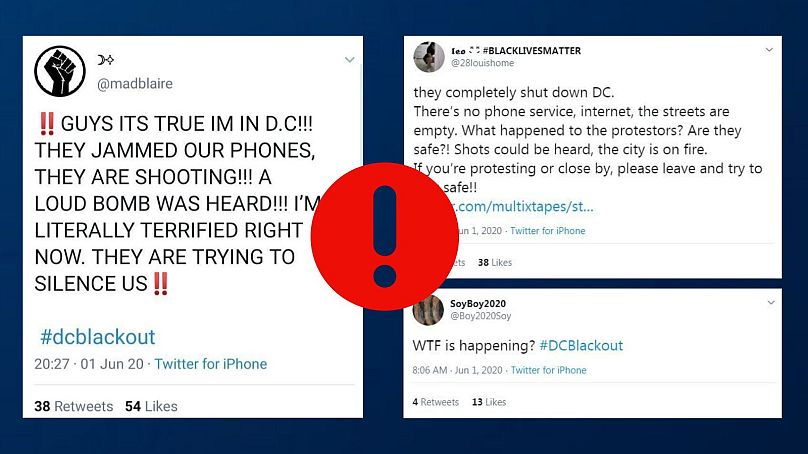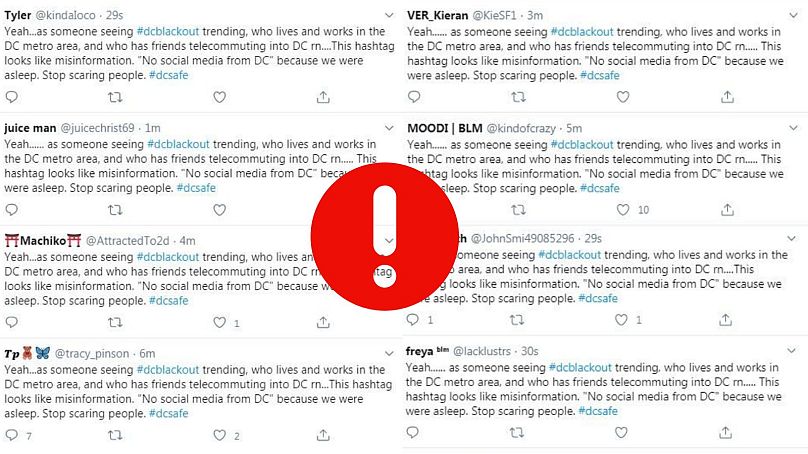There is no evidence that the US capital experienced an internet outage during George Floyd protests, despite numerous claims on social media.
A network of bot-like accounts has spread confusion and misinformation online during protests in the United States.
On Monday, thousands of social media users shared #dcblackout, many claiming that Washington DC had experienced an outage of internet and cellular communications.
The rumours came during widespread protests across the United States over the death of George Floyd. The 46-year-old died after a police officer was filmed with his knee on the neck of Floyd as he was arresting him in Minneapolis on May 25.
Some users falsely suggested that the blackout had lasted for up to six hours, potentially as a strategy to allow violent police action to go unreported.
The hashtag #dcblackout was also shared on Facebook, Instagram, Reddit, and TikTok.
NetBlocks, an organisation that monitors global internet connectivity, have confirmed that their intelligence showed "no indication of a mass-scale internet disruption" in the US capital.
Observing fixed-line and cellular data, NetBlocks said that connectivity had remained stable throughout Monday.
Large crowds of demonstrators may have limited mobile phone signal in the area, but no widespread blackout was confirmed.
Journalists and social media users in Washington DC have also said that they had not been affected by any communications disruption on Monday.
A Twitter page for the Black Lives Matter movement in the city also denounced the rumours as "fake".
So why did the hashtag trend worldwide?
'Newly created accounts' and 'suspicious handles'
Experts have suggested that #dcblackout was one of the more interesting disinformation campaigns observed in recent years.
#dcblackout received more than 790,000 tweets across the world on June 1 and was a top trending topic in many European countries.
One of the earliest tweets to share the hashtag received more than 84,000 likes and over 27,000 retweets.
But many Twitter accounts promoting #dcblackout claims seemed to exhibit bot-like behaviour and could have been created for the purpose of spreading disinformation.
These bot-like accounts had few followers, unusual handles or profile pictures, and had posted the same exact wording as other users.
Some Twitter users claimed that their accounts had also been hacked to post the same message.
Esteban Ponce de León, a research assistant at the Atlantic Council's Digital Forensic Research Lab, told Euronews that they had identified "newly created accounts" reminiscent of bots, which were helping #dcblackout to trend.
"The lack of original content indicates that these accounts mainly amplifying posts," said Ponce de León.
"This technique could help to increase the volume of the hashtag, making the hashtag appear more popular or influential than it really is."
But the confusion spread even further, and analysts have suggested that an organised network of bots attempted to sew confusion and discord during the protests.
Another false rumour widely shared on social media pictured a large fire near the famous Washington Monument.
While some areas of the US capital had been set alight by demonstrators, the shared image was a screenshot from the fictional television series Designated Survivor. But the false rumour quickly went viral on Twitter.
Meanwhile, at the same time, other bot-like accounts began tweeting that #dcblackout was fake.
"As someone seeing #dcblackout trending, who lives and works in the DC metro area, and who has friends telecommuting into DC rn..... this hashtag looks like misinformation," said hundreds of different accounts.
This bot-like activity demonstrated a high level of digital sophistication and severely inhibited fact-checking efforts during the demonstrations.
How did social media respond?
In a statement to Euronews, Twitter said that they were actively investigating #dcblackout and had suspended hundreds of spam accounts using the hashtag.
"We’re taking action proactively on any coordinated attempts to disrupt the public conversation around this issue," said a Twitter spokesperson.
Twitter is already conducting transparency reports and does not allow spam or other types of platform manipulation under its policies.
Twitter users "cannot artificially amplify or disrupt conversations through the use of multiple accounts".
But analysts are warning that more bot activity could appear on social media platforms ahead of the US presidential elections in November.
"Some of the main reasons on why bot-like accounts amplify these hashtags could be to push domestic political agendas or to shape political discussions online," De León told Euronews.
"We, as users, should be careful about how we engage in trending topics."
"Sometimes, we, as users, amplify specific narratives or hashtags without intention, leading to misinformation about certain topics."
Watch Seana Davis' report for #TheCube in the player above.













